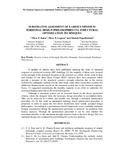| dc.contributor.author | Bakas, Nikolaos | |
| dc.contributor.author | Lagaros, Nikos D. | |
| dc.contributor.author | Papadrakakis, Manolis | |
| dc.date.accessioned | 2015-12-11T13:56:05Z | |
| dc.date.available | 2015-12-11T13:56:05Z | |
| dc.date.issued | 2008 | |
| dc.identifier.uri | http://hdl.handle.net/11728/6599 | |
| dc.description.abstract | A number of articles have been published, studying the issue of torsional
response of reinforced concrete (RC) buildings [1], the majority of them were focused
on the strength of the structural elements or the structure as a whole. In the work by Kan and Chopra [2] the Base Shear Torque (BST) surfaces have been proposed which
provide a measure of the structural system’s strength reduction due to the torsion
inflicted by earthquake loading. On the other hand, some other researchers examine the additional displacements caused on the structural system due to the torsional response. Paulay [3] suggested maximizing the ductility capacity in an effort to undertake the increased displacement due to the torsional response.
Although a structural system can be assessed based on the above mentioned
criteria, where the designer lacks the necessary design procedure to accomplish them. This can be achieved in a robust and reliable way through a structural optimization procedure [4]. In this work an automated topology based optimization procedure is proposed, in order to assess the two above mentioned, most widely accepted design philosophies. According to a performance-based framework, every candidate optimum designs encountered during the optimization procedure is assessed via nonlinear time history analyses. Through the optimization procedure it can be seen whether the maximum ductility or the maximum strength criterion leads to the best design. The two optimum designs are compared by performing life cycle cost analysis. | en_UK |
| dc.language.iso | en | en_UK |
| dc.publisher | WCCM | en_UK |
| dc.relation.ispartofseries | 8th. World Congress on Computational Mechanics (WCCM8);5th. European Congress on Computational Methods in Applied Sciences and Engineering (ECCOMAS 2008) | |
| dc.relation.ispartofseries | ;June 30 – July 5, 2008 | |
| dc.relation.ispartofseries | ;Venice, Italy | |
| dc.rights.uri | http://creativecommons.org/licenses/by-nc-nd/4.0/ | en_UK |
| dc.subject | Torsion | en_UK |
| dc.subject | Centre of Strength | en_UK |
| dc.subject | Ductility Demands | en_UK |
| dc.subject | Overstrength | en_UK |
| dc.subject | Nonlinear Time history | en_UK |
| dc.title | Substratum Assessment of Various Minimum Torsional Design Philosophies via Structural Optimization Techniques | en_UK |
| dc.type | Working Paper | en_UK |


